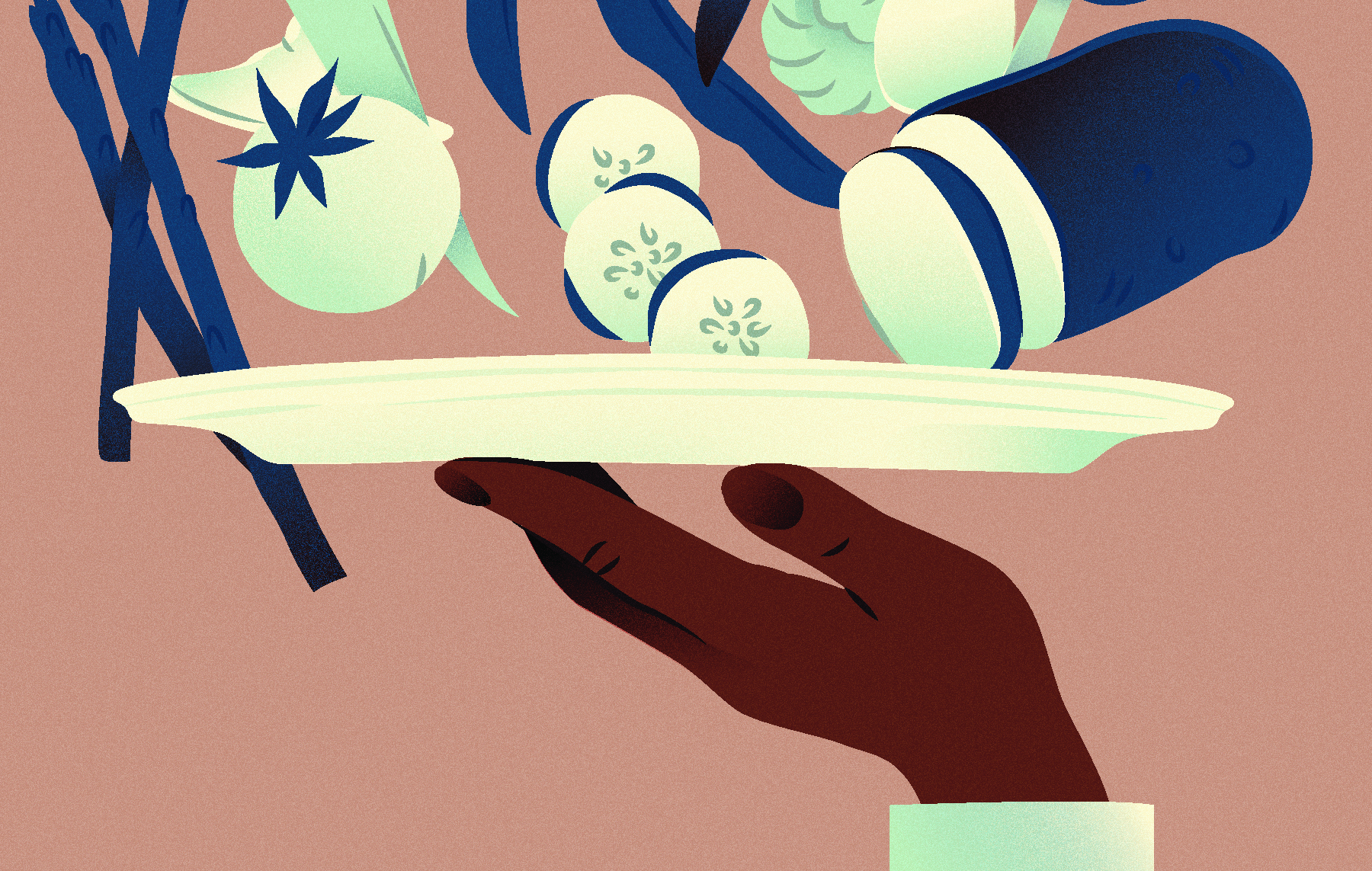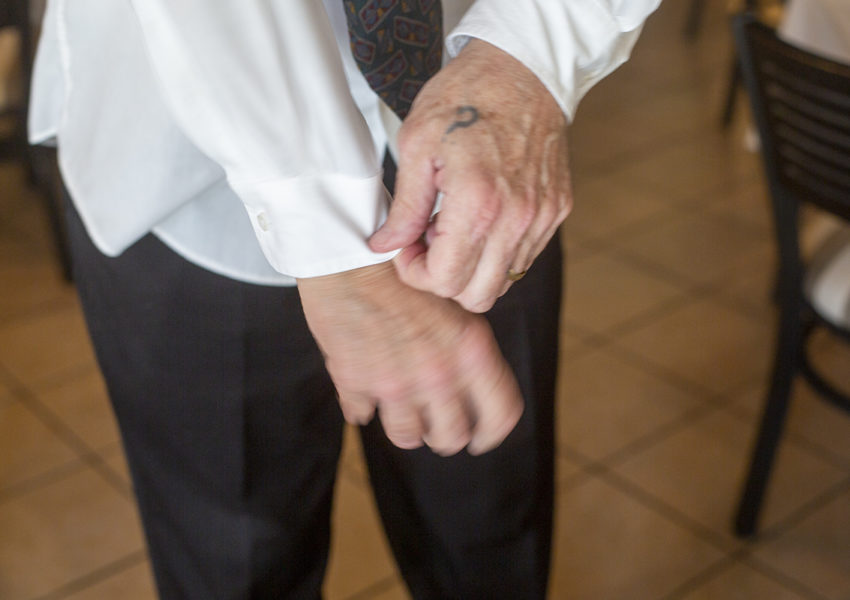Serving and Being Served Hell is needing other people.
by Jenna Mason
I strode confidently into my interview with the chef-owner. I had a dozen years of serving experience and solid industry references.
I explained that I’d never worked at a white-tablecloth restaurant and emphasized my eagerness to learn. I walked away twenty minutes later with a W-9 in my hand and a start date on my calendar.
In my first few days, I learned my way around the kitchen, the walk-in, the servers’ station, the computer system. I followed servers, and I ran food. After shifts, I studied The World Atlas of Wine and memorized French “mother sauces” and their derivatives.
Sporadically, after interacting with a table, a veteran server would ask if I had questions. I rarely did. Serving had always come naturally, and I geeked out learning the cuisine and terminology. I aced every menu test.
Chef complimented my work ethic. He put me on the floor just days before graduation at the university that sustains our town. I sipped bourbon on my front porch that evening to celebrate. I’d made the cut.

My first serving shifts taught me that the finer points of fine dining had little to do with describing a Côtes du Rhône or distinguishing a demi-glace from a bordelaise.
In my obsession with learning information, I had failed to study the norms and rituals that would be second nature to someone who dined out often. I’d taken for granted that my expertise waiting tables at casual restaurants would transfer seamlessly to this new environment.
Chef took pleasure in teaching me otherwise. He belittled employees for any and every mistake.
I learned more: When my table stands to leave, I must be waiting to hold the door for them. When I drop a check, I must pick it up within seconds of the guest inserting their payment. When a guest excuses herself, I must immediately fold her napkin over the back of her chair. I must never set a bottle of wine on a table before pouring.
I must not introduce myself.
“That’s for f—ing Applebee’s,” Chef scowled.
Chef took pleasure in belittling employees for any and every mistake.
Friends asked: Did I love my new job? Wasn’t I just so happy to be waiting tables again? Was I making good money? I crafted a standard reply.
“The money is great. The environment is … intense.”
With that pause, I tried to convey what I couldn’t say out loud in a small and gossipy town.
The condescending and contradictory scolding infuriated me: “If you don’t know something, you have to ask. If you’re in the weeds, ask for help. Just f—ing ask!”
Then, “You don’t know what’s in a gremolata? Jesus, it’s three f—ing ingredients!” Or, “It’s a beurre blanc, not a béarnaise. BUR. BLAHNK. Why do you even work here?”
I redoubled my efforts, mostly out of spite. I pushed myself to master the menu better than anyone on the floor. I pressured the bartenders to let me open every bottle of wine for practice. I coached newer employees off the clock in hopes I could spare them unwarranted humiliation. I never showed a negative emotion. And I kept asking for help no matter how many times Chef called me an “idiot.”
I learned how to provide meticulous service in an environment that demanded it, but all I cared about was proving Chef wrong. Eighteen months later, with an array of new skills and not a drop of regret, I put in my two weeks. When I thanked Chef for everything I’d learned, he shrugged. He mumbled, “Okay,” and turned back to the grill.
Armed with hard-won experience, I secured a serving position at a new restaurant and excelled. Management recognized my familiarity with upscale dining, and the very green serving staff occasionally looked to me for assistance. Things went swell for three years.

![]()
Then, this July, I slipped on a rain-slicked crosswalk and broke my kneecap clean in half.
The aftermath of that accident overwhelmed me. In mid-June, I had ended a three-year relationship, and despite some assistance from my former partner, money was already very tight. In the chaos of moving, I had failed to realize my health insurance expired at the end of that month. I couldn’t have afforded surgery and physical therapy, even if I could have continued waiting tables. Now I would miss football season altogether, the most lucrative months for servers in my college town.
Friends drove me around and brought me meals. My dad loaned me money to get through my first round of utility bills. My children’s father took them everywhere they needed to go. My bosses at my day job gave me unprecedented flexibility, while my coworkers picked up my slack.
All this kindness humbled and reassured me. I felt proud of myself for letting folks help and sometimes even asking for help. I pictured Chef yelling at me over the pass, “If you’re in the weeds, ask for help!” I laughed to think that lessons from that awful job might just get me through this.
I stayed optimistic those first few weeks of recovery, but the emotional strain of needing so much steadily wore me down. I started lying about having a ride when I really used taxis and Ubers for four out of five errands. I used cash advances from my credit card to pay for basic needs, knowing the interest rate far exceeded what I could repay.
I gained a new understanding of the saying, “It’s better to give than to receive.” Giving feels good. Receiving sucks.
I pictured Chef yelling at me over the pass, “If you’re in the weeds, ask for help!”
I grew anxious about my dwindling finances. Without health insurance, I had to prepay every visit to the orthopedist, to physical therapy, and to my primary care doctor, whom I had to see every fifteen days to refill my pain medication. The price of my routine antidepressants soared from about $10 to $125, so I cut back on them.
My paychecks are direct-deposited into an out-of-state bank, and that debit card was canceled because of fraudulent activity. For more than a week, I couldn’t access what little money I had.
In August, I learned that I was still on the hook for a lease my ex-boyfriend and I had signed back in February. I owed twice the rent on half my usual income.
Checks bounced. Overdraft fees mounted.
I totaled up exactly how much I needed immediately to get myself back in the black. More than $7,000 dollars, not counting the major medical expenses for which I’d sought assistance. I consulted my dad to strategize, but we struggled to find any short-term options for getting me out of the hole.
On a Tuesday in mid-September, I dropped the ground turkey I was opening to make hamburgers for my kids. I fell apart. The only other food in the house was ramen—the cheap kind—and we’d eaten ramen the previous two nights in a row. I called my ex-husband to pick up our children, and I panicked myself to sleep.
When I got home from work the next afternoon, my electricity had been cut off. I was certain a paycheck would clear the next morning, and I’d be able to get the lights turned back on. It didn’t.
I was no longer in the weeds. I was in a f—ing forest, paralyzed.
I called my best friend and told her everything through sobs. She paid to get my electricity reconnected. She rallied friends and acquaintances, and dozens donated whatever they could to help. In less than a week, I knew I would be okay, at least long enough to plan my next move.
I also knew that, as with many other things, Chef was only half-right. The real lesson here is not to ask for help when you’re in the weeds, it’s this: Don’t wait until you’re in the weeds to ask for help.
Jenna Mason is a freelance writer and editor with twenty years of experience in the restaurant industry.




